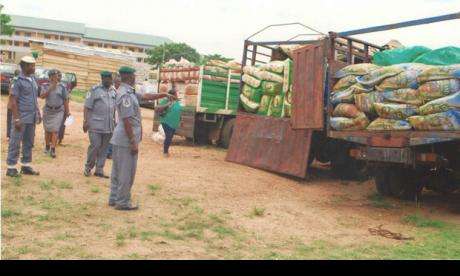By Stephen Ubanna
Rice importers across the country appear to be in dilema over government policy measure baring rice importation from the Central Bank of Nigeria , CBN,allocation, from the foreign exchange, forex, market. Rice , vegetable Oil and processed tomatoes/Tomato paste and palm oil are among the 41 items classified by the apex bank as ineligible for forex, according to Isaac Okoroafor, an Assistant Director, and the apex bank spokesman because they could easily be produced in Nigeria, rather than spend the country’s reserves to import them.

The importers may have been forced to source their forex for their rice imports because of the fiscal policy measure which was said to have been initiated by the National Economic Council, NEC, headed by Ngozi Okonjo-Iweala, the then minister of Finance and Coordinating minister of the Economy at the instance of former President Goodluck Jonathan.
President Muhammadu Buhari may have found the economic policy workable that he did not hesitate in enforcing into law through a CBN Circular that was released in June 2015, barely one month in office. Aliyu Muhammed, Managing Director, Nigeria River Basin Development Authorities has justified baring the 41 items including rice and tomato/ paste to the huge scarce forex spent yearly by the government on food imports.
Prior to the implementation of the CBN circular by the Nigeria Customs Service at the ports and land border stations, Aliyu confirmed that the government was accumulating annual import bill of $11 billion.
Many had expected the government to reverse the policy because of its implication to the economy. This is because of the recent revision of the documentation requirements for forex allocation for small scale importation and transactions value of $20,000 and below per quarter by the bank, making possible for such importation to qualify for forex allocation but on the condition that the importer must complete form Q.
Okoroafor , the apex bank spokesman may have dampened the enthusiasms of the rice importers to get a reprieve on Thursday, May 4, 2018, when he said that the 41 classified items by the apex bank are still not valid for forex allocation. It was bad news for the rice importers who had been going through difficult times sourcing for forex through the black market to remain in the business and keep Nigeria port busy.
More frustrating to them was the additional 70 percent levy on the cost of rice importation by the government. Still having a toll on their business was the high cost of clearing the bulk cargo from Nigeria ports. The consequence of the government was the forced relocation of these rice importers to Cotonou port and other ports in the West African sub-region to take delivery of their cargoes, which still found their way to Nigeria markets through unapproved routes. Investigation by The Source shows that ship loads of rice sailing to Apapa port and other ports within the country were said to have been diverted either to Cotonou , Abidjan, or Tema ports in Republic of Benin, Cote’dvoire and Ghana respectively.
The Magazine learnt that ships loaded will prefer to be on the queue at any of these neighboring countries seaport rather than sailing to Nigeria that has the market to discharge its cargo at the designated port.
Heineken Lokpobiri, minister of state, ministry of Agriculture and Rural development confirmed that importation of rice and other food items over the last couple of months had reduced significantly, stressing that that the battle has not been won. ” Food imports into the country are reduced to the barest minimum”.

The drop in importation of food items due to the government fiscal policy measures baring 41 items including rice and vegetable oil have been the gain of smugglers. Muda Yusuf, Director General, Lagos Chamber of Commerce and Industry, LCCI, wants the government to review the tariff on rice to curb its smuggling.
An aggrieved Yusuf said: ”Rice smuggling has continued to thrive , despite barring it from the forex market by the CBN”. He noted that rice is not a Contraband Commodity because it could still be imported through the seaport . The LCCI boss disclosed that what is creating the problem of smuggling of the Commodity is the high tariff of imports through the country’s seaports.
From, Lagos, Ogun, Oyo, Osun, Cross river, Kaduna, Kano Jigawa, Katsina, Sokoto, Kebbi, Zamfara, Kwarra to the north eastern states of Bauchi, Taraba, Adamawa, Borno to Yobe, the story is the same. Smuggling of rice and vegetable.
It is not surprising why rice and vegetable oil are found in all nooks and crannies of the Nigeria market. many believes that the Customs anti-smuggling war in the south is yielding results with the seizure of thousands of ”50” kg bags of foreign parboiled rice which translates to several trucks load of rice monthly. The arrowhead of the seizures, Muhammed Uba Aliyu, Comptroller, Federal Operations Unit, FOU, Zone A, was said to be making things making things difficult for the smugglers.
There is hardly a week, an insider said that the Command Surveillance and the Lagos Roving team officers including the Headquarters Strike Force, Lagos, Zone, under Salisu. A, an Assistant Comptroller, who is the Commandant.
Sources told the Magazine some vegetable oil importing firms who had queued into the government policy to import semi-processed have established vegetable oil processing firms at established approved free trade zones within Lagos, Calabar, Onne and Kano to take advantage of the available raw material for processing and packaging of the product in the country. The establishment of these vegetable oil firms has created a big market for the palm oil market in Nigeria as farmers are smiling to the bank daily and job opportunities created for the teeming unemployed youths across the country.





